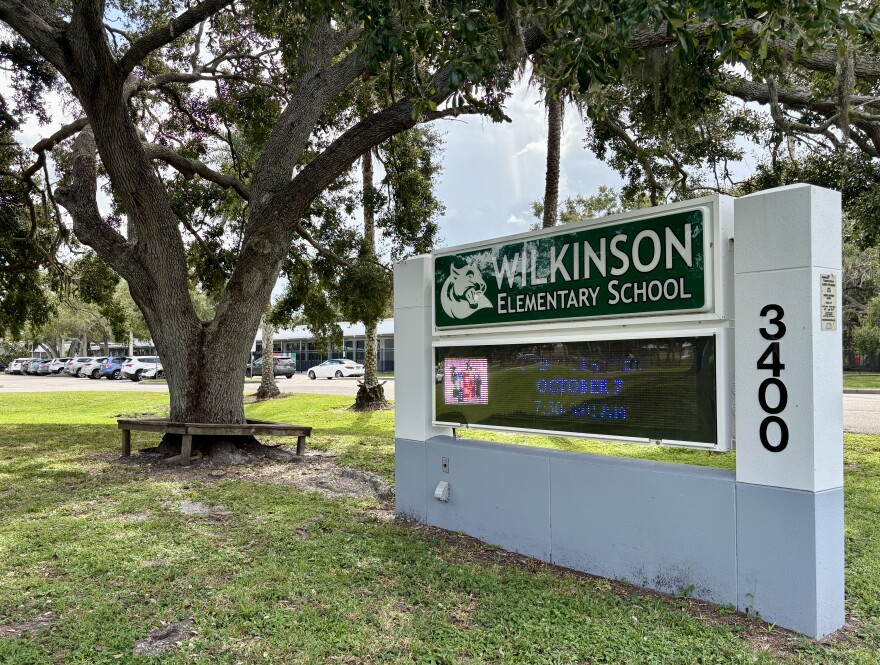Sarasota County Schools announced preliminary plans last month to shutter Wilkinson Elementary and shift students to other public schools to stave off a charter operator from moving in to fill empty space.
If approved, the closure of Wilkinson — currently a C-rated school and the only one in the county that’s nationally STEM-certified — would be Sarasota County’s first public school closure in half a century.
The proposal has sparked widespread outcry from Wilkinson parents who packed emergency meetings, petitioned lawmakers to unwind aggressive state charter expansions and lobbied the School Board of Sarasota County to find an alternative.
School board members now say the plan is not final, hinting that Wilkinson may survive after all.
But Wilkinson is not the only Sarasota County school in jeopardy.
Despite countywide population growth, a Suncoast Searchlight review of state enrollment data found that more than 20 other Sarasota schools have steadily lost students for more than a decade, including some of the district’s most prestigious and top-ranked campuses, like Pine View School for the Gifted.
If the numbers don’t improve by January, any of them could become the next target forced to roommate with an unwanted charter school.
The bleak landscape comes in the wake of a new state law passed in the 11th hour of the legislative session that allows charter school operators to move into public campuses if the facilities have any unused space. The public school system would then be forced to foot the bill for utilities, busing, custodial services and even meals for those new charter students — all at no cost to the charter operator.
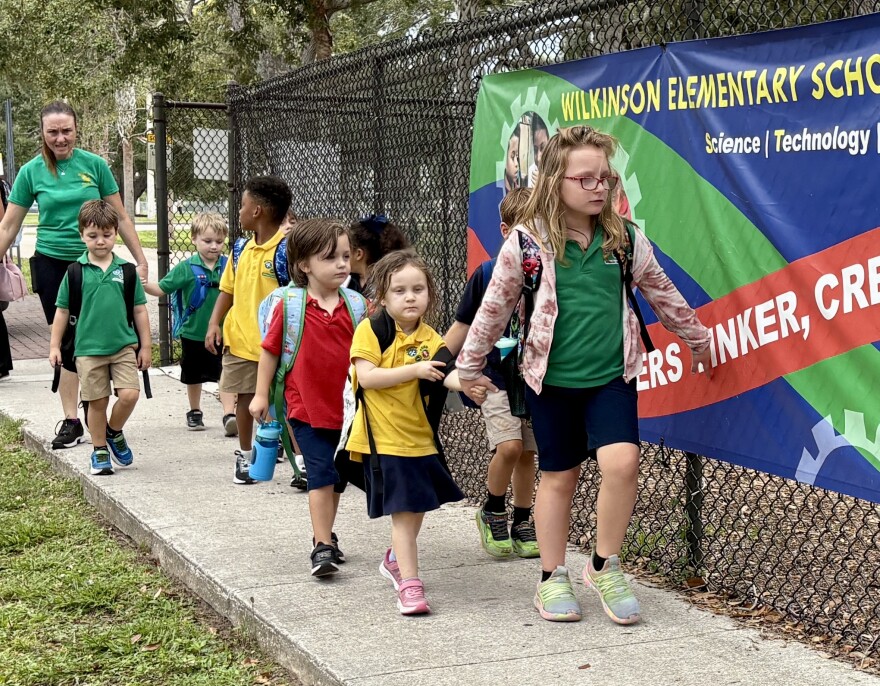
While earlier versions of the measure threatened only underperforming schools, the law now opens the door to for-profit charter school companies to occupy space on any public school with enough room to accommodate them.
As new residential developments push growth east and south, the risk rises in older and established neighborhoods with fewer children. And schools are already losing students to the homeschooling trend. Public middle schools also have become more prone to the enrollment dips, according to the state data.
“It’s a perfect storm coming together creating all these problems,” said Carol Lerner, a retired public educator and director of Support Our Schools, a Florida-based nonprofit advocating for public schools. “This is one of the worst pieces of legislation I have ever seen … A lot of the suburban districts built new schools, and now there’s a capacity problem. It’s a mess.”
The school district declined to comment for this story. A district spokesperson instead referred reporters to comments made by officials during a Sept. 9 public workshop.
“Education is at a crossroads,” Sarasota Schools Superintendent Terry Connor said at the meeting. “When you think about a lot of the legislation, specifically the Schools of Hope, the expanding of FES scholarships (Family Empowerment Scholarship). We are seeing a reshaping of public education, especially here in Florida.
Connor said the district must find ways to protect its resources and traditional public schools and cannot simply wait and hope the situation improves.
But parents and public education advocates say singling out Wilkinson is not the answer.
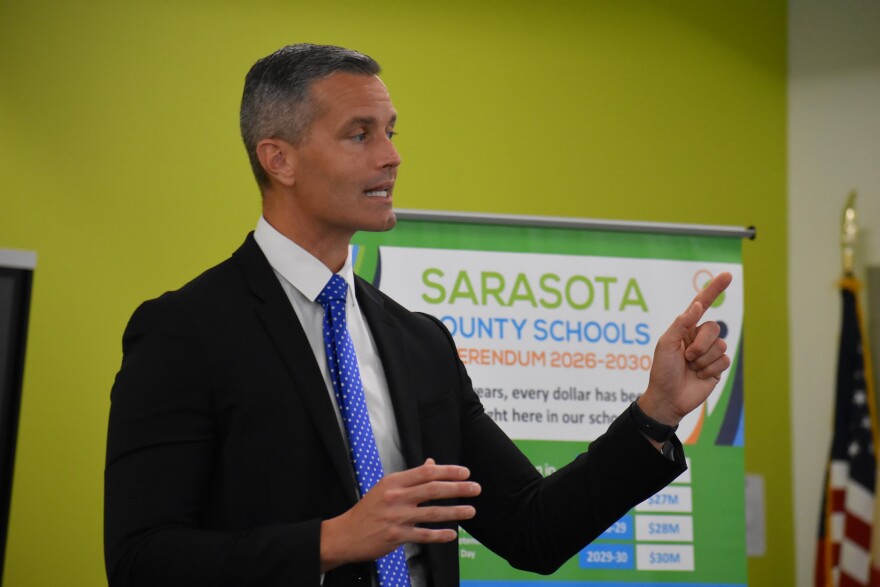
Even if it were to close, several other area schools would still remain at risk as early as next year, leaving the district scrambling to adjust school zone boundaries, add new programming to fill seats or close other campuses.
“In the most clandestine way possible, through proviso language buried in the budget instructions, our legislature essentially granted large, out-of-state entities squatters’ rights in our schools,” said Holly Bullard, chief strategy and development officer with the Florida Policy Institute, who has a child at Wilkinson.
“This creates chaos, forces districts to divert resources to fund charter operations and puts thousands of schools across Florida at risk of forced co-location, including more than a dozen right here in Sarasota County.”
Schools of Hope sets bullseye on public school enrollment
The impetus for the possible Wilkinson closure is a massive expansion to Florida’s “Schools of Hope” program, which allows charter school operators to tap grants and low-interest loans to open new schools on existing public campuses.
Florida Gov. Ron DeSantis touted the sweeping new law during a Sept. 25 press conference in Miami, where he announced the New York-based charter school network Success Academy will open its first Florida campus as part of the state's Schools of Hope initiative.
Schools of Hope originally took over failing schools or those with a high number of Title I students — meaning children from low-income families or with limited English proficiency.
The changes this year allow School of Hope to now move into a public school regardless of its academic performance so long as there's an underused, vacant or surplus facility or unused student stations. Even an A school like Pine View could be at play.
The measure does not set a specific capacity threshold, meaning a school could come in if there is just one or 100 empty seats. Lerner said the sweet spot for these charter operators seems to be about 400 seats.
“We have to push our facility usage, our student stations, as high as we can, so we don’t leave them open for others to potentially take over,” Connor said at the Sept. 9 meeting.
“In plain terms, I feel like it’s a subsidizing of our buildings and our resources when we allow that to happen,” he said. “So we want to be proactive in looking at specifically what seats are available.”
To combat the threat, Sarasota County Schools is reviewing several strategies to ensure the best use of district facilities. One proposal under consideration is to close Wilkinson after this school year and reassign its roughly 400 students to Alta Vista, Brentwood and Gulf Gate Elementary schools, which are similarly struggling to fill capacity. Wilkinson would then be repurposed into the district's headquarters, moving from its current location at The Landings.
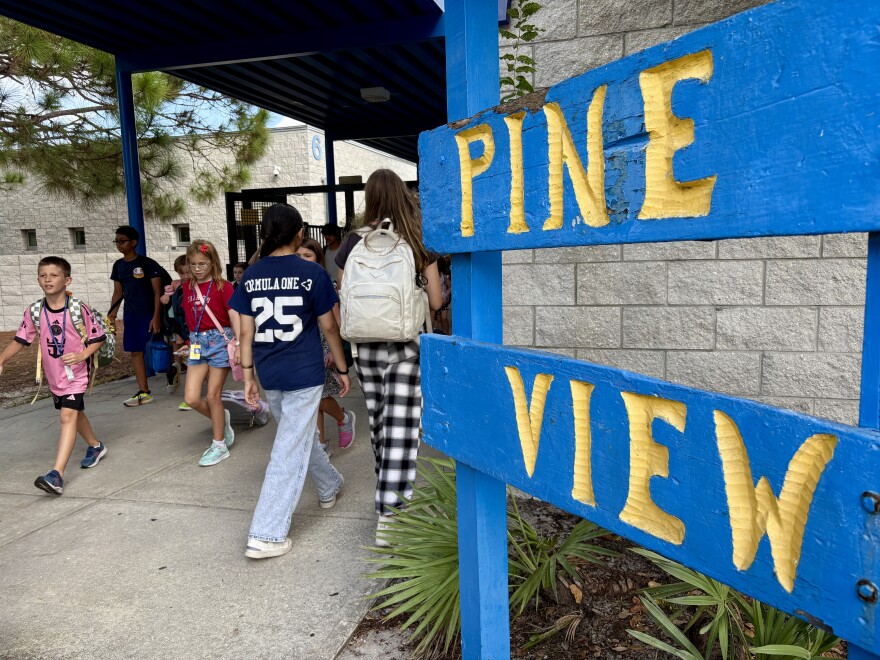
That plan is slated for discussion at the Oct. 7 school board meeting and would go for a final vote on Nov. 18.
School officials, many of whom said they feel blindsided by the aggressive legislation, say the goal now is to stay competitive amid the changing landscape with school choice, vouchers and the ongoing proliferation of charter programs.
Student enrollment drives class sizes, transportation routes and ultimately, funding. To survive, the district must keep enrollment at the forefront.
“Any time you talk about closing a school, that guts you,” school board member Liz Barker said at the meeting.
“This appears to be inevitable,” she said. “I understand that, and I absolutely think we need to take swift and decisive action. But how can we preserve some of what makes Wilkinson special?”
She noted that after Schools of Hope took over Jefferson County schools a few years ago, academic gains quickly faded and enrollment plunged.
“At the end of the day, they’re not a great answer for communities,” Barker said. “They’re really not … I think it’s important to note, Schools of Hope is a failed experiment, and to push them into our schools is not good.”
Robyn Marinelli, chair of the school board, told Suncoast Searchlight the possible closure of Wilkinson pained her — but that the state law allowing charter schools to take over “underutilized” public schools has left few options for the district. Even if it takes closing one school in an attempt to save others.
“It's a wonderful neighborhood school, so everybody's upset, and I get it,” Marinelli said. “I don't want it either, but I certainly would rather go along with the superintendent's recommendations because those kids would be funneled to Alta Vista, Brentwood and Gulf Gate, so that would push them up almost to capacity.”
A longtime supporter of charter schools, Marinelli nonetheless voiced outrage at the new law.
“I mean, [charter schools] can come in, literally, and they don't pay for a thing,” Marinelli exclaimed. “We have to pay for transportation facilities, you name it, lunch.”
Wilkinson parents fight to keep their school
Jodanna Osceola is a stay-at-home mother of three who moved to her neighborhood of Sarasota after the COVID-19 pandemic specifically to be close to Wilkinson.
She is among two dozen close-knit families who all live within blocks of each other. They walk to school together. Their kids play together. And now, they’re coming together to try to save the school they love.
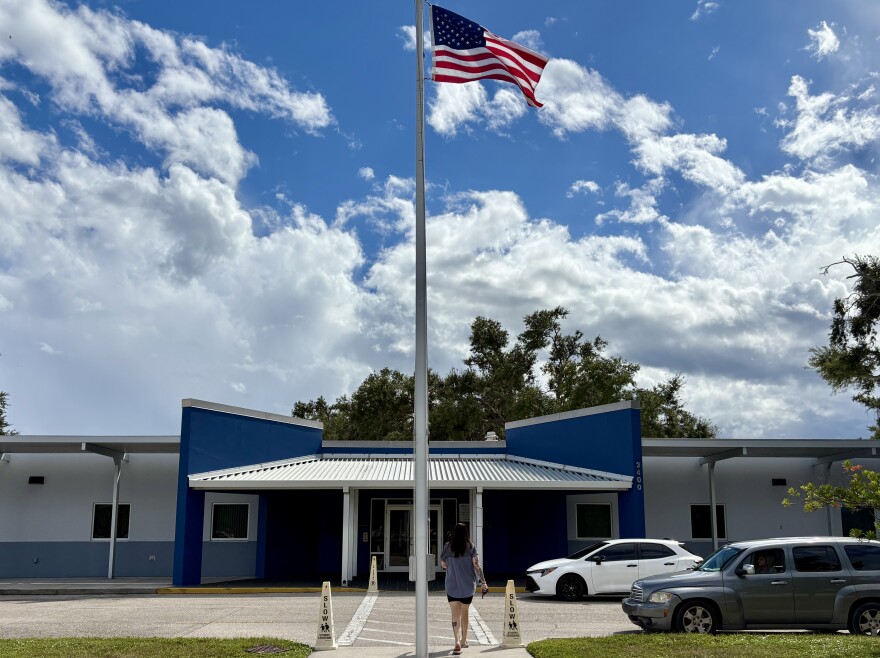
When Osceola first approached the district about rumors of the school closing in August, she said she was assured nothing had been set. But within a week, district officials were moving forward with a public proposal to shutter Wilkinson.
Since then, parents like Osceola have organized neighborhood meetings, spoken out at school board workshops, met with legislators and scrambled to come up with any other viable alternatives.
After the proposal was announced, Osceola received postcards in the mail from private and charter schools already soliciting her kids to go there instead.
“We bought our home so we’d be able to walk all of our kids to school,” Osceola said. “I’m not happy. A lot of parents aren’t happy. We chose Wilkinson for a reason. I’m just going to keep trying (to fight) because I don’t want to lose my school.”
More than 75 parents gathered at a community meeting on Sept. 18 to vent frustrations and discuss options. Rather than just bowing to the state, they want the district to fight back and find a plan that doesn’t make their school the scapegoat.
They praised the class sizes, teachers and learning environment at Wilkinson.
“When you go into the school, you can see how happy the kids are,” said Laquichia Webb, a teacher with three kids at Wilkinson. “The teachers greet them and know them by name. You can just feel the kindness and care … Of all the schools to close, this is a huge mistake.”
Wilkinson parents point to the different ways to utilize space, including more childcare and Pre-K programming, and the need for the district to think more “outside the box.” They also blasted district officials for the lack of communication and earlier warnings. Many parents first learned of the plan through media reports, with just weeks to prepare before a decision is slated to become final.
They question what happened to their school choice.
“I now know firsthand the heartbreak and anger that moms and dads across our state are feeling when their choice is stripped away,” Bullard said. “In a time when school choice is being pushed as the ultimate goal, the choice of the vast majority of parents in Sarasota and across Florida — our local public schools — must be protected.”
In response to the outcry, some school board members said the plans could still change, with the district now shifting to explore other options. They cite a long-term, three-pronged approach to combat the problem.
Until that happens, Wilkinson's parents say they do not plan to back down.
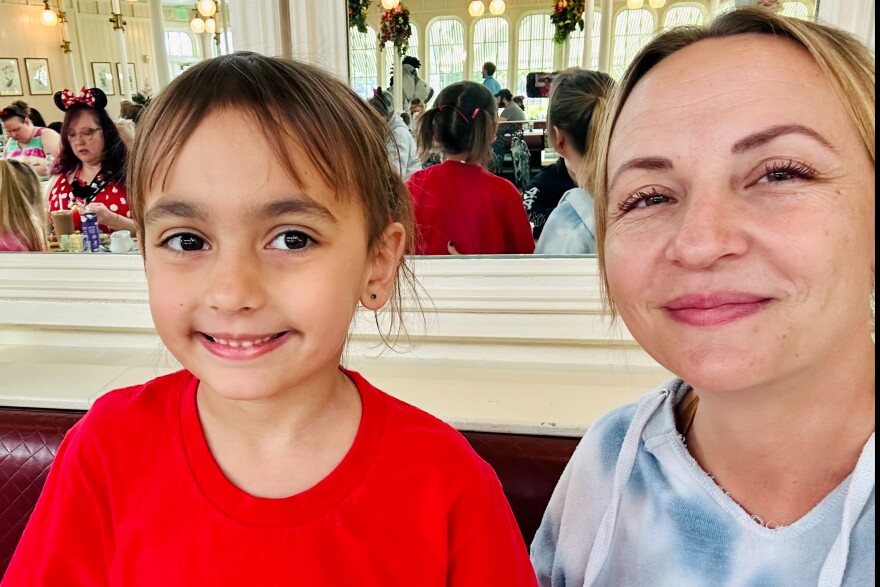
“While the enrollment numbers may be small, the very size of the school is what makes it exceptional,” said Meredith Karp, whose daughter is in second grade at Wilkinson. “The close-knit environment allows students to receive individualized attention and ensures that teachers are not overwhelmed. Every child is truly seen and supported, and there is a real sense of community where everyone knows each other.
“Closing the school is a bandage on the bigger problem, a quick fix, and it would deprive future families in the neighborhood of their neighborhood school.”
As public schools lose students, many remain at risk
Enrollment data show more than 20 schools have been bleeding student numbers for years — each now at similar risk of a Schools of Hope takeover.
Fifteen of those schools saw enrollment drop by at least 10% since the 2013-14 school year, the earliest data available from the Florida Department of Education. Among them is Wilkinson, which lost 88 students, or about 17% of total enrollment during that timeframe.
Two of the schools slated to absorb some of Wilkinson students have shrunk even faster, with enrollment plummeting 29% at Alta Vista and 21% at Gulf Gate.

Middle schools also have been losing students, led by McIntosh, Brookside and Booker. Officials say that’s because middle school is the time many parents decide to either homeschool or seek a charter with smaller class sizes. The district has announced no plans yet to handle those declines.
In all, eight local schools saw steeper enrollment declines than Wilkinson.
Even Pine View — one of the top-ranked public schools in the nation — has faced enrollment woes. Student numbers at the grades 2-12 gifted school fell from 2,180 more than a decade ago to just over 1,750 last year, the data shows.
That’s nearly 430 seats of available capacity that could become the target of a charter school come January.
Pine View Principal Stephen Covert did not return calls and emails seeking comment on enrollment trends.
“The overall issue of under-enrollment is, in some cases, districtwide,” school board member Tom Edwards told Suncoast Searchlight.
He criticized “squatter” charter schools and the decade-long plan to “destroy public education and instill for-profit charter schools.” That intensified the problem.
But he also noted the trend has been building since he was first elected in 2020. New real estate development in recent years has concentrated in areas that were historically rural, like eastern and southern swaths of Sarasota.
To accommodate these new households, the district opened the K-8 Skye Ranch for the first time this year, costing about $8 million annually to operate. Next year, the district will debut a new high school in North Port’s Wellen Park at an annual budgeting expense of $10 million.
But that has further eroded enrollment at schools in older parts of town, where the numbers already are trending downward. Edwards says it will take a comprehensive approach to make sure no others face the same potential fate as Wilkinson.
“My goal is to make sure our constituents are happy, and there are a lot of unhappy Wilkinson families who feel they’re being targeted,” Edwards said. “This is a result of not paying attention to the politics of public education.”
Suncoast Searchlight reporter Alice Herman contributed to this report.
This story was produced by Suncoast Searchlight, a nonprofit newsroom of the Community News Collaborative serving Sarasota, Manatee and DeSoto counties. Learn more at suncoastsearchlight.org.

